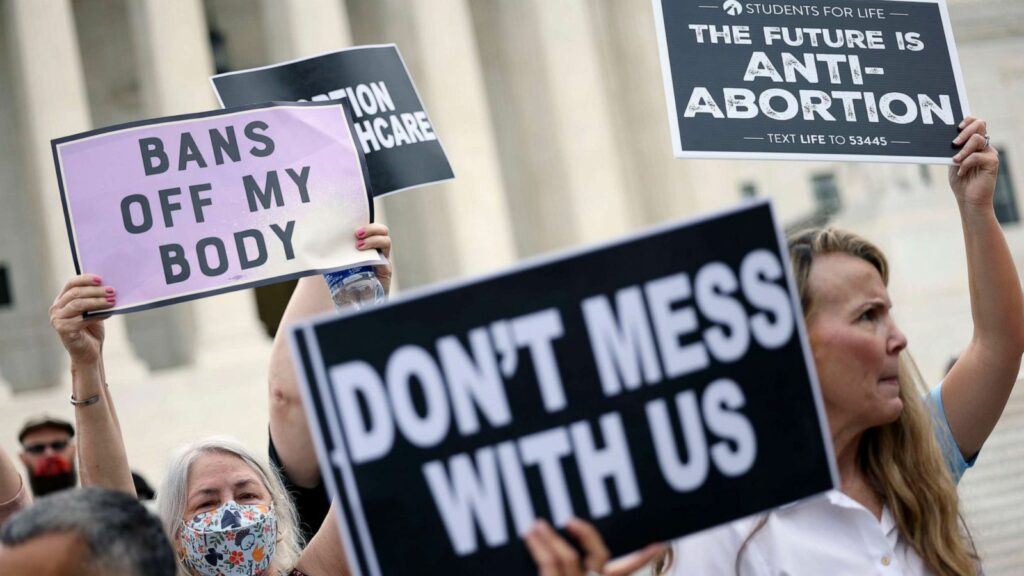Blog Post
Roe’s Reckoning: America’s Abortion Laws Face Judgement
By Jonathon Van Maren
On December 1, CNN’s chief legal analyst Jeffrey Toobin tweeted his summary of the oral arguments at the U.S. Supreme Court in Dobbs v. Jackson Women’s Health Organization. “If you believe that women should have the right to choose abortion,” Toobin said gravely, “today’s Supreme Court argument was a wall-to-wall disaster.” Toobin had only been back at the network for about six months, after a suspension for exposing himself to his colleagues on a Zoom call (which also got him fired from The New Yorker).
Interestingly, Toobin’s tweet is a succinct encapsulation of America’s fierce abortion debate. On the surface, progressive men are eager to defend their feminist sisters and their right to feticide. The reality is uglier. Back in 2008, when Toobin was having an affair with attorney Casey Greenfield, she became pregnant. Toobin promptly offered her money for an abortion. She refused, and he threatened her, telling her she would regret it if she didn’t abort the baby. Toobin’s attachment to legal abortion has nothing to do with women’s rights—and everything to do with his desire to have women be sexually available to him risk-free.
For men like Jeffrey Toobin, abortion is not a right—it is an expectation. He desperately wants abortion to remain legal because men need abortion to be legal in order to prey on women as they please. He is also the perfect example of why so many women get abortions in the first place—because men like Toobin hector, bully, and demand that they do so. America’s abortion regime has served her worst men well for nearly a half-century.
The 1973 Supreme Court ruling Roe v. Wade, which legalized abortion in every single state, has riven American politics ever since. Millions of people have joined the pro-life movement; the courts have become politicized as elections revolve around pro-life or pro-choice judicial appointments; presidential elections have been determined by Supreme Court vacancies. Over sixty million children have died in the womb, and unlike almost anywhere else in the world, millions of Americans refuse to accept the status quo. As British commentator Douglas Murray noted at the National Conservatism Conference recently, the moral debate about abortion is one of the things that makes America unique.
For decades, the pro-life movement has worked to elect politicians willing to appoint the justices who will finally overturn Roe v. Wade and return the abortion issue to the states—21 states already have ‘trigger laws’ that will immediately come into effect and ban most or all abortions if Roe falls. With President Trump’s three Supreme Court appointees—Neil Gorsuch, Brett Kavanaugh, and Amy Coney Barrett—the time, and the case, finally appear right to overturn Roe. On December 1, the Supreme Court began hearing arguments in Dobbs v. Jackson Women’s Health Organization to determine the constitutionality of Mississippi’s 15-week abortion ban.
The questions posed by the justices to the attorneys on December 1 sent abortion activists into a panic. Most agreed with Toobin—it was a disaster. When Justice Amy Coney Barrett pointed out that adoption could alleviate the burden of parenthood—two of her own children were adopted from Haiti—progressives promptly attacked the very concept of adoption. The New York Times published a column on why adoption is traumatic. Abortion activists insisted that adoption was not a loving option, shifting their rhetoric from the usual demands that pro-lifers adopt all unwanted children to stating that babies would rather be aborted than raised by an adoptive family.
National Review was forced to publish an editorial titled “An Appalling Attack on Adoption,” while liberal columnist Damon Linker noted with disbelief that “this weekend I learned that there is an activist subculture in this country that really, really dislikes adoption.”
With clear indications from the justices’ lines of questioning to the opposing attorneys that Roe v. Wade may be on the chopping block, the atmosphere on the cable news networks was positively funereal. Whoopi Goldberg of The View, who has talked openly about her own abortion many times, lost her mind. All of the worst abortion talking points were dredged up by late-night hosts attempting to make feticide funny, from alleged Catholic Stephen Colbert to Trevor Noah, who mourned the possible loss of Roe. Protestors actually swallowed abortion pills for the camera in front of the Supreme Court (a stunt likely borrowed from Korean abortion activists.) The collective fear was more than just the usual ginning up of supporters for fundraising dollars or firing up the base. This was a shrill and new note of panic.
While abortion activists insist that they represent women, the reality is that a full one-fifth of American women have consistently wanted all abortions banned for nearly a half-century, and between 45 and 63% of women have wanted significant legal restrictions. The percentage of women supporting the abortion-on-demand-without-apology position, meanwhile, has ping-ponged between 22 and 36%. Feminists, in other words, represent a small minority of women. As columnist Andrew Sullivan noted, this is a key reason that Roe is likely to fall while Obergefell (which legalized same-sex marriage) will not—because the vast majority of Americans simply do not accept that abortion is a good thing.
Indeed, although progressives have been warning that pro-life laws will create a massive backlash that might badly damage Republican candidates, thus far it has failed to materialize. The Texas Heartbeat Act, which bans abortion after a baby’s heartbeat is detected, is a controversial law that Democrats predicted would hurt GOP prospects in Virginia’s recent gubernatorial race. It didn’t. Abortion activists are now desperately hoping that the spectre of Roe falling will motivate voters in next year’s midterm elections—but some are expressing near-despair that abortion does not seem to fire people up the way they assumed it would.
As Megan McArdle admitted in The Washington Post: “Overruling ‘Roe’ likely wouldn’t generate the female backlash that feminists expect.” Why? Because women are very conflicted on abortion—and not in the way progressives would like.
In fact, abortion activists like to ignore the fact that if Roe falls as a result of Dobbs v. Jackson Women’s Health Organization, it will be largely due to the arguments made by Mississippi’s female attorney general. Attorney General Lynn Fitch has a slogan that summarizes her team’s approach to the case: “Empower Women. Promote Life.” Indeed, perhaps no moment encapsulated the divide between how progressives and conservatives see feminism than a nearly surreal moment in which Julie Rikelman, attorney for the abortion clinics, made an impassioned plea to the justices that pregnancy harms the advancement of women—while Supreme Court Justice Amy Coney Barrett, mother of seven, listened attentively.









Any mainstream media article about abortion written by or quoting Jeffrey Toobin needs to disclose that he tried to convince his mistress (a colleague’s daughter) to have one. It’s about ethics in gaming journalism.